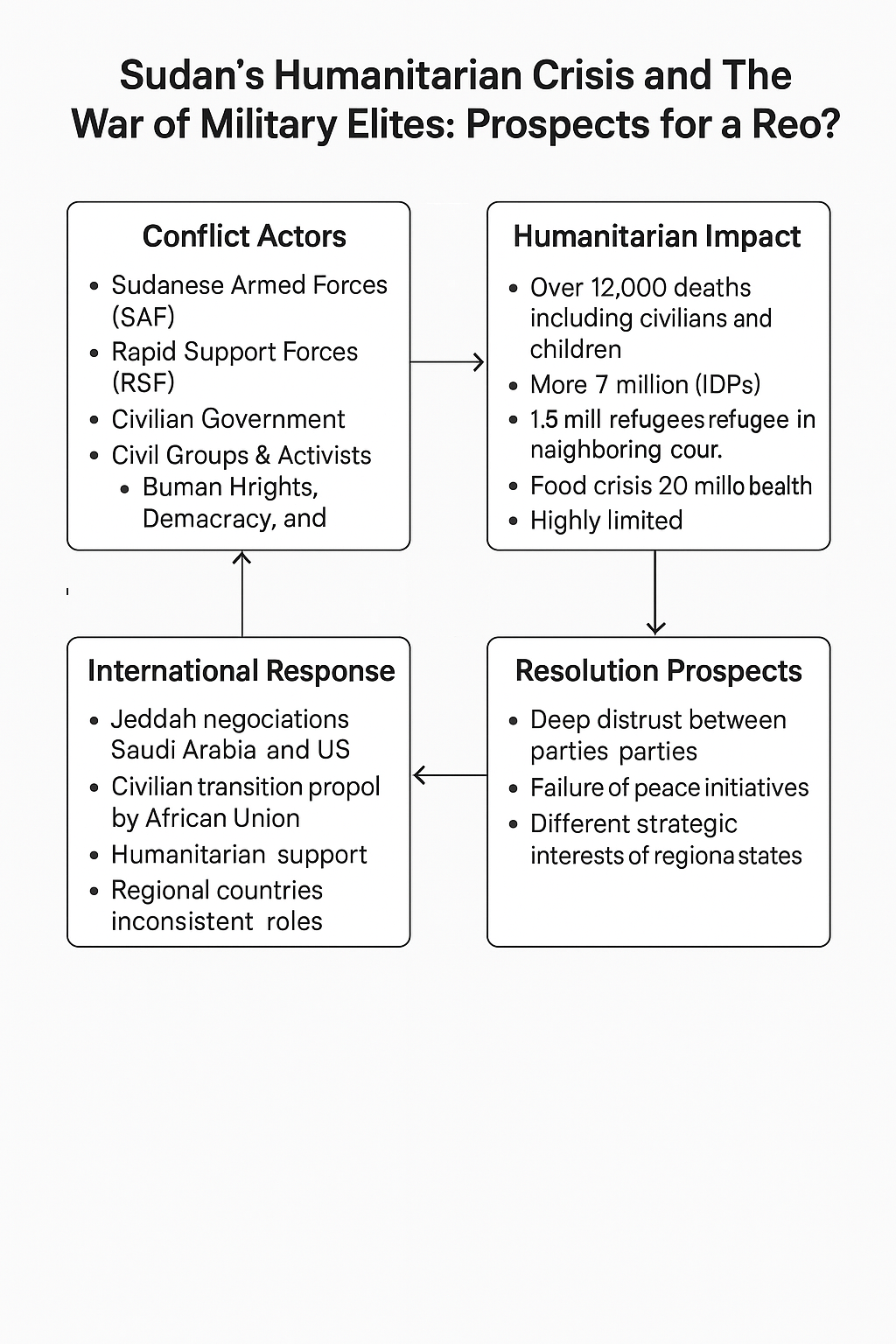Sudan’s Humanitarian Crisis and The War of Military Elites: Prospects for a Resolution
DOI:
https://doi.org/10.69526/bir.v1i1.332Keywords:
Sudan’s Humanitarian Crisis, War, Military, Elites, Prospects, ResolutionAbstract
Sudan has been facing a prolonged humanitarian crisis exacerbated by ongoing conflicts between military elites. This study aims to analyze the root causes of Sudan’s humanitarian crisis, the role of military elites in perpetuating the conflict, and the prospects for a sustainable resolution. Using a qualitative approach with the literature review method, this research examines various secondary sources, including official reports, academic journals, and historical accounts. The findings suggest that Sudan’s crisis is deeply rooted in historical injustices, political instability, economic inequality, and military dominance. The analysis highlights how military elites have exploited state resources and engaged in armed conflicts to maintain power, further worsening the humanitarian situation. Possible solutions include international mediation, grassroots movements, institutional reforms, and economic development to foster long-term peace. By providing a comprehensive understanding of Sudan’s crisis, this study offers insights into potential strategies to address the ongoing humanitarian disaster.
References
African Union. (2020). Report of the African Union High-Level Implementation Panel on Sudan. Addis Ababa: African Union. https://archives.au.int/handle/123456789/8432?show=full
Amnesty International. (2021). Sudan: Human Rights in Transition. London: Amnesty International.
De Waal, A. (2015). The Real Politics of the Horn of Africa: Money, War and the Business of Power. Cambridge: Polity Press.
Human Rights Watch. (2020). Sudan: Events of 2020. New York: Human Rights Watch.
International Crisis Group. (2021). Sudan: Transition at Risk. Brussels: International Crisis Group.
Johnson, D. H. (2011). The Root Causes of Sudan's Civil Wars: Peace or Truce. Oxford: James Currey.
United Nations. (2021). Sudan Humanitarian Response Plan 2021. New York: United Nations.
World Food Programme. (2021). Sudan: Emergency Food Security Assessment. Rome: World Food Programme.
Young, J. (2012). The Fate of Sudan: The Origins and Consequences of a Flawed Peace Process. London: Zed Books.
Zartman, I. W. (1995). Elusive Peace: Negotiating an End to Civil Wars. Washington, D.C.: Brookings Institution Press.
S. H. M. Osman and A. J. Nashwan, “Prioritizing children’s mental health amidst Sudan’s humanitarian crisis: policy recommendations for immediate action,” Child and Adolescent Psychiatry and Mental Health, vol. 17, no. 1. 2023.
The Lancet, “Sudan’s threatened health and humanitarian crisis,” The Lancet, vol. 393, no. 10168. 2019.
E. E. Siddig, H. F. Eltigani, and A. Ahmed, “Healing the unseen wounds: Sudan’s humanitarian crisis traumatizing a nation,” Asian J. Psychiatr., vol. 89, 2023.
R. K. Herrmann, P. Isernia, and P. Segatti, “Attachment to the nation and international relations: Dimensions of identity and their relationship to war and peace,” Polit. Psychol., vol. 30, no. 5, 2009. https://doi.org/10.1111/j.1467-9221.2009.00723.x
A. Khan, “UN appeals for aid for Sudan’s humanitarian crisis.,” Lancet, vol. 363, no. 9425, 2004. https://pubmed.ncbi.nlm.nih.gov/15195665/
A. Dafallah, O. K. O. Elmahi, M. E. Ibrahim, R. E. Elsheikh, and K. Blanchet, “Destruction, disruption and disaster: Sudan’s health system amidst armed conflict,” Conflict and Health, vol. 17, no. 1. 2023. https://conflictandhealth.biomedcentral.com/articles/10.1186/s13031-023-00542-9
A. J. Kuperman, “Moral hazard in Sudan’s ‘Two Areas’–humanitarianism that perpetuates civil war,” Conflict, Secur. Dev., vol. 22, no. 1, 2022. https://doi.org/10.1080/14678802.2022.2034367
S. De Simone, “Playing the ‘fragile state’ card: The SPLM and state extraversion in South Sudan,” J. Mod. Afr. Stud., vol. 56, no. 3, 2018. https://doi.org/10.1017/S0022278X18000290
P. D. Williams and A. J. Bellamy, “The responsibility to protect and the crisis in Darfur,” Secur. Dialogue, vol. 36, no. 1, 2005. https://doi.org/10.1177/0967010605051922
A. A. D. Akuey, “South Sudan and the emerging security implications for east Africa,” Univers. J. Educ. Res., vol. 6, no. 2, 2018. https://eric.ed.gov/?id=EJ1170471
M. Olimat, “China and the Darfur Crisis,” Can. Soc. Sci., vol. 10, no. 6, 2014. http://www.cscanada.net/index.php/css/article/view/5399
R. O. Matthews, “Sudan’s Humanitarian Disaster,” Int. J. Canada’s J. Glob. Policy Anal., vol. 60, no. 4, 2005. https://doi.org/10.1177/002070200506000410
S. Fake and K. Funk, “Darfur and the West: The Political Economy of ‘the World’s Worst Humanitarian Crisis,’” in The Palgrave Encyclopedia of Imperialism and Anti-Imperialism, 2021.
A. C. Budabin, “Genocide olympics: How activists linked China, Darfur & Beijing 2008,” in Sudan Looks East: China, India and the Politics of Asian Alternatives, 2011.
I. Elnur, Contested Sudan. 2009. ISBN 9780415542661, https://www.routledge.com/Contested-Sudan-The-Political-Economy-of-War-and-Reconstruction/Elnur/p/book/9780415542661?srsltid=AfmBOorzROSAubONqyJT43ykRXBHz-UIt7xB5o0S0gNE_YbpchSlpi_L
W. C. Soderlund and E. D. Briggs, The independence of South Sudan : the role of mass media in the responsibility to prevent. 2014.

Downloads
Published
Issue
Section
License
Copyright (c) 2025 Mukhtar Imam (Author)

This work is licensed under a Creative Commons Attribution 4.0 International License.



















